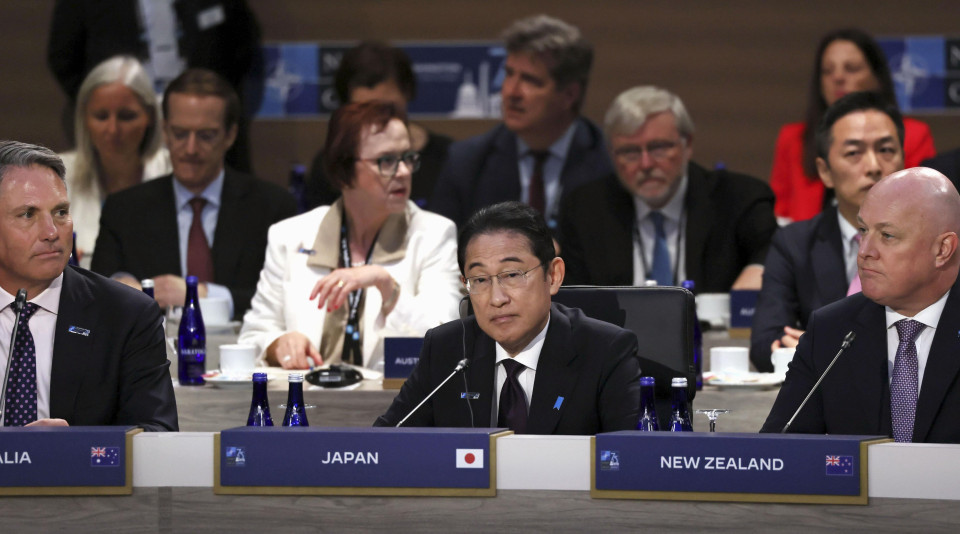NATO and its four Indo-Pacific partners -- Australia, Japan, New Zealand and South Korea -- agreed Thursday to launch what they call "flagship projects" in four areas, including cyber defense and countering disinformation, to broaden practical cooperation in the face of more complex and interrelated security challenges.
The two other new joint initiatives they agreed on during a NATO summit in Washington involve providing medical assistance to Ukraine and collaborating on emerging technologies such as artificial intelligence, according to officials.
With nondemocratic countries such as China, North Korea and Russia seen as major destabilizing factors in both the Euro-Atlantic and Indo-Pacific regions, Japanese Prime Minister Fumio Kishida said in his speech that Tokyo will work even more closely with NATO members and the three other regional partners.

At a session with NATO and the partners, Kishida invited them all to meet in Japan to discuss measures against disinformation at an event slated to be held by next spring, according to a Japanese official.
Kishida was quoted by the official as telling the participants that Japan is committed to reinforcing a free and open international order based on the rule of law.
The White House said NATO leaders and their counterparts from the four countries discussed "the increasing connectivity between Euro-Atlantic and Indo-Pacific security," and that they expressed "grave concern" over North Korea's deepening military and economic cooperation with Russia.
A day after China was denounced as a "decisive enabler" of Russia's war against Ukraine in a declaration approved by all NATO members, the White House said the leaders discussed their shared worries over Beijing's support for Moscow's defense industrial base.
Describing the three-day summit from Tuesday as a "great success," Biden said at a press conference that NATO and its like-minded partners have to make sure that Chinese President Xi Jinping "understands there is a price to pay for undercutting both the Pacific basin as well as Europe."
Through U.S. leadership efforts, NATO has increasingly acknowledged since the beginning of Russia's invasion of Ukraine over two years ago that developments in Asia can directly affect its own security.
China's transfer of microelectronics and other dual-use materials to Russia is believed to be revitalizing Moscow's offensive in Ukraine.
The transatlantic alliance, which this year marked the 75th anniversary of its foundation, has been stepping up its relationship with the four countries particularly since 2022, when for the first time it identified China as posing "systematic challenges" in a document laying out its priorities for the next decade.
Australia, Japan, New Zealand and South Korea do not belong to NATO, the world's largest military alliance, officially called the North Atlantic Treaty Organization. But the group, which now has 32 members, has invited them to its summit every year since the 2022 gathering in Madrid.
Attending for the third straight year, Kishida also held one-on-one talks with NATO Secretary General Jens Stoltenberg.
Kishida told him that Japan will strengthen its coordination with NATO to share confidential information and promote cooperation in various areas, including outer space, cybersecurity and joint naval exercises, based on their bilateral agreement.
According to the official, Japan and NATO are planning to carry out a joint training exercise in waters in the Euro-Atlantic region later this year.
Ahead of the talks with NATO and its Indo-Pacific partners, Kishida also took part in a meeting of the four countries, collectively known as the IP4, and discussed similar issues, according to the Japanese Foreign Ministry.
The meeting was later joined by Ukrainian President Volodymyr Zelenskyy, who thanked the partners and said that support from the Indo-Pacific region has become even more important for Ukraine, the ministry said.
Related coverage:
Japan, South Korea leaders agree North Korea-Russia ties as serious threat
NATO leaders call China "decisive enabler" of Russia's war on Ukraine
U.S. envoy hails tighter NATO, Indo-Pacific ties amid China rise
 By Takuya Karube,
By Takuya Karube,









